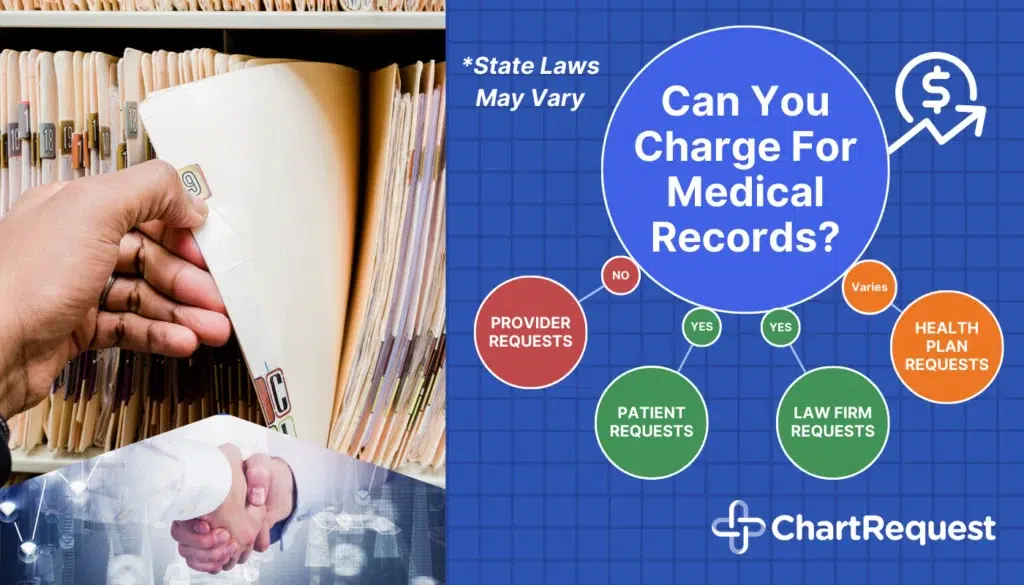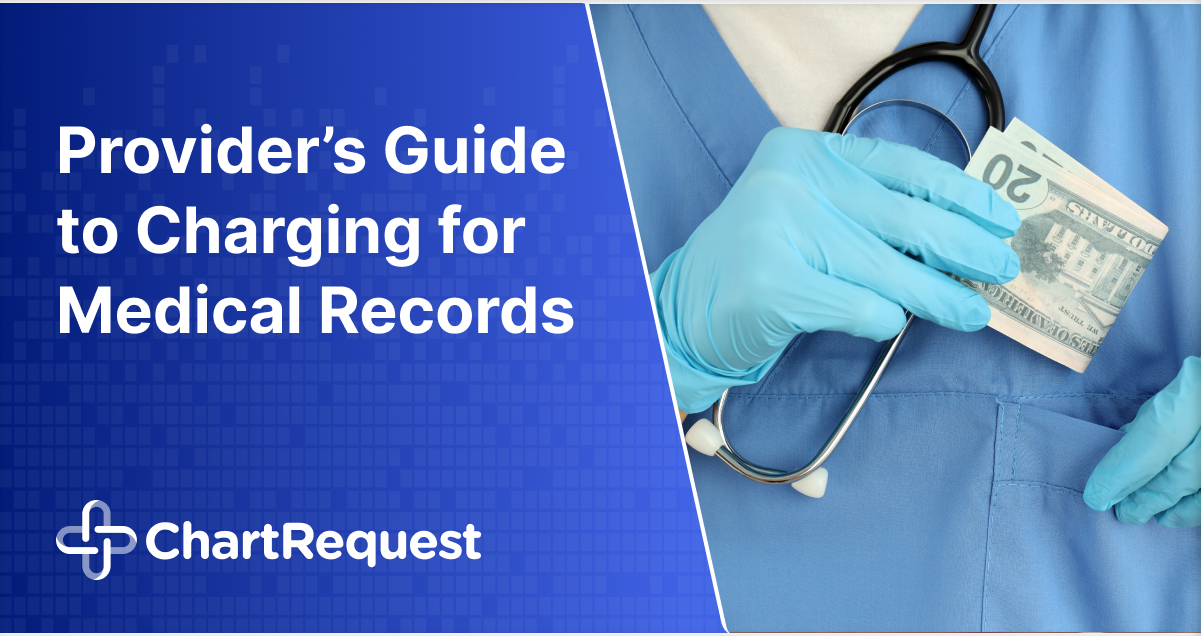The release of information (ROI) is a necessary, yet expensive process for healthcare providers. From staffing to material costs, some organizations spend 6+ figures to fulfill ROI obligations. To offset these costs, many organizations across the country are charging for medical records and other protected health information (PHI).
Medical records are a fundamental part of healthcare that contain essential information about a patient’s health history, treatments, and diagnoses. In this article, we’ll explore how your practice can charge for medical records.
How Does Charging for Medical Records Work?
Before charging for medical records, healthcare providers need to be aware of several key considerations to ensure compliance. These factors include understanding the applicable regulations, establishing appropriate fee structures, maintaining patient privacy and security, and implementing efficient processes.
First and foremost, healthcare providers must familiarize themselves with the regulations that govern charging for medical records. The Health Insurance Portability and Accountability Act (HIPAA) sets guidelines for the release of medical records, including the permissible fees that can be charged.
In addition to HIPAA, healthcare providers should be aware of any relevant state laws and regulations regarding charging for medical records. State laws may introduce additional requirements or restrictions, such as fee limitations or specific disclosure obligations.
Healthcare providers must ensure their fee structures are fair, transparent, and accurate to any costs involved. Factors including administrative fees for processing requests, copying fees for duplicating records, and mailing or delivery fees may impact pricing.
Maintaining Compliance With HIPAA
HIPAA is a federal law that protects the privacy and security of patients’ health information. It establishes guidelines and regulations for the release of medical records, including the charging process. Understanding the basics of HIPAA is crucial for healthcare providers to ensure compliance and protect patients’ privacy rights.
These regulations outline how healthcare providers handle medical records and the security measures they must implement to protect patient information. It also sets guidelines for charging fees for providing medical records.
This also grants patients certain rights when it comes to their medical records. This includes their ability to access, amend, and request restrictions on the use and disclosure of their medical records. HIPAA legally empowers patients to obtain copies of their medical records or have them transmitted to designated individuals or entities.
To comply with HIPAA, healthcare providers must have compliant processes in place when charging for medical records. This includes following established fee structures, protecting patient privacy, maintaining the security of protected health information, and documenting all relevant actions and communications related to releasing medical records.
Maintaining Compliance With State Laws
In addition to HIPAA, state laws can introduce additional regulations and variations concerning charging for medical records. These laws may differ from one state to another, impacting fee structures, timelines, and requirements for record release. Healthcare providers must comply with their state’s laws when charging for medical records.
State laws significantly impact how healthcare providers charge for medical records. Copying fees and regulations related to charging for medical records can vary across states. Different states may have different fee structures, allowable charges, and timelines for providing records.
Charging for Medical Records for Different Request Types
When it comes to charging for medical records, it’s crucial to consider the different types of requestors who may seek access to these records. The main requestor types include patients, insurance companies, attorneys, government agencies, and healthcare providers. Each type of requestor has specific considerations and requirements.

Patients Requests: Patients who request their medical records are covered by several laws and initiatives to ensure a hassle-free process. Patients often request their own medical records if they want to create a personal health record. If a patient requests their records, they’re covered by HIPAA’s reasonable cost-based fee limitations.
Patient-Directed Requests: Sometimes, patients request their medical records but direct them to a third party, such as another healthcare provider. Please note that charging for medical records during care coordination is prohibited, and requests from other healthcare providers are non-billable.
Third-Party Requests: Insurance companies, attorneys, and other third parties may need access to medical records for various purposes. These may include claims processing, disability insurance, worker’s compensation, etc.
Charging different fees based on the type of requestor is often necessary. For example, when comparing HIPAA and state pricing limitations, the rule of thumb is to work in patients’ best interest. For example, while HIPAA allows providers to charge patients reasonable, cost-based fees, a healthcare provider in Kentucky is still obligated to provide the first copy of the patient’s records for free.
Why Should Your Organization Be Charging for Medical Records?
Healthcare organizations face various financial pressures, including the rising costs of providing quality care. Charging for medical records helps support the financial sustainability of healthcare organizations by offsetting release of information costs. For example:
Administrative Costs: The release of medical information involves significant administrative expenses for healthcare providers. When someone submits a request, staff members must spend time locating, retrieving, and organizing the PHI. Additionally, they need to ensure the records don’t contain any sensitive information that shouldn’t be disclosed.
Technology and Infrastructure: To manage the release of information efficiently and securely, healthcare providers often use robust health IT systems. Implementing these systems generally involves substantial up-front costs and additional ongoing contractual expenses.
Legal and Regulatory Compliance: Healthcare providers must adhere to strict legal and regulatory requirements when releasing medical information. To comply with these regulations, providers may need to employ legal counsel or hire specialized staff to ensure that the release of information process continuously aligns with current laws.
Training and Education: Healthcare providers must ensure their staff members are well-trained in handling medical records and patient information. Organizations must teach their ROI teams the intricacies of HIPAA and other laws to avoid accidental breaches or inaccurate charges.
Third-Party Services: Some organizations either use ROI software in-house or outsource the release of information. Dedicated release of information software can simplify compliance and reduce turnaround times.
ChartRequest Makes Charging for Medical Records Easy
If you’ve ever tried to calculate the price of requested medical records, you know how complicated the process is. Often, state pricing statutes require different charge limits for different page ranges in the same request. Add search fees, different limits for imaging records, and other variables, and suddenly you need to be a spreadsheet pro.
ChartRequest is a release of information solution that helps healthcare providers across the country simplify every aspect of records exchange. Our 250+ pricing algorithms help eliminate the spreadsheets so you can focus on providing an exceptional care experience.
Also, requestors may occasionally have concerns or disputes related to charges for medical records. ChartRequest offers all requestors white-glove support to ensure consistently positive experiences. With an average Google Reviews rating of 4.9 stars, ChartRequest leads the industry in user satisfaction.
Ready to see ChartRequest in action? Set up a brief demo call or explore our software and services.


